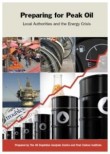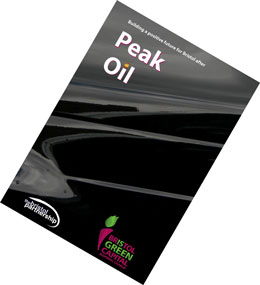危機的な地球環境問題とは、「ピーク・オイル」。
「大量石油消費」が「人口爆発」と「都市化」を招いている。
そして、それが原因となって、さらに、石油需要が旺盛になる。まさに、悪循環。
その石油生産が需要を満たせなくなりつつある。
油田の発見のピークは1963年。
巨大油田は生産量を低下させている。
人口増加と都市化が新たな需要を生んでいる。
現況の消費を続ける限り、サウジアラビアクラスの油田が4つも必要といわれる。
今後の景気回復を前提とすれば6つも必要となる。
ところが、それを知らないか、無視している人が多い。
日本では、マスコミが話題にしないので、知っている人は少ない。
改めて言うが、「ピーク・オイル」とは、石油の生産量が需要を満たせなくなること。
可採埋蔵量の枯渇とは異なる。
人類にとっても、我らが石油依存文明にとって、重大な危機なのに、知る人は少ない。
IEA(国際エネルギー機関)がピーク・オイルは2006年だった、との報告を公開した。
World Energy Outlook 2010
もうひとつ、
2012年現在、世界の人口は70億人。2050年には91億人。
現在、都市の人口が50%超、それが増加中。
都市は圧倒的な「オイル食い」モンスター。
というわけで、
「ピーク・オイル」のことを知って、「ライフスタイルを変える!」
日本でも、ピーク・オイル対策(石油消費削減策)を始める時が来ている。
だが、マスコミは無視し、政治家、官僚と学者は知らないふりをしている。
そこで、このサイトを開設した。海外情報が多いのは、日本人の無関心を示している。
使命:
「日本を変える」
具体的には、「ピーク・オイル後社会への移行」の啓蒙と「ライフスタイル変革」の方法追求。
行動:
①海外のピーク・オイル情報の収集
②海外資料検討会(特定の資料の分析を行う)の設立
③講演、読書会
④石油ピーク後社会への移行を研究
⑤「ライフスタイル変革」の方法追求
⑥脱原子力:生態系外のエネルギー利用は人知を超えているので危険。
緊急提言
関西電力大飯原発の再稼働に反対する。
①福島事故から何も学んでいない。生態系外のエネルギー利用は人間には不可能。
②放射性廃棄物の処理のメドすらたっていない。
③エネルギー過剰消費についての反省がない。
④野田総理の再起動理由は誤っている。過酷事故のリスクと電力不足のリスクとは同列に比較できない。
⑤財政再建を消費税増税に頼る野田総理のアイディアのなさ。見識を疑う。地球環境問題を考えていない。日本国だけを見て、地球全体を見ていない。
加えて、
原発稼働は、ピーク・オイルによる石油高騰を回避するための予備的な対策と言い出しかねない。要ウォッチ。
ボランティアで協力いただける方は、「ライフスタイル変革」学習会:古野 操(comspot2007@asahi.email.ne.jp)までご連絡ください。
Links
・ブログ「ライフスタイルを変える!」
・Twitter@minimalist2009
・地球環境問題を考える基本資料
・地球環境問題に関する海外お薦めサイト(更新停止中)
| リンク|新着|サイト紹介(日本)|サイト紹介(海外)|スライドショウ|動画|ブログあれこれ| レポート/論文/書籍/書評/インタビュー/新聞記事| |
基本資料:2012年6月18日 (月曜日)更新
今、まさに、「ピーク・オイル後の社会」について語る時。
ピーク・オイルを語らないサイト:

ODAC has prepared a report aimed specifically at local government in the UK called Preparing for Peak Oil: Local Authorities and the Energy Crisis (PDF, 2647 Kb). Copies of the report can be ordered, free of charge, from ODAC for either members of local government, or Councillors. e-mail: info@odac-info.org (please give details of your role) or telephone: +44 (0)20 8144 8359.
Download the full
report
Download the
Executive Summary
Read reviews of
the report
| 理解を深める ピークオイルについて我々が確実に知るようになるのは、それが現実に起こった後のみである。 しかし今ここで大切なのは、パニックに陥らず、価格高騰の根底にある原因を自分でより深く学び、自分なりに備えることである。 これには、車に乗らずに出かける、相乗りをする、公共の交通手段を利用する、 自転車を買うといった非常に小さな行動から、ハイブリッド車(あるいは、発売されればプラグイン・ハイブリッド車などもよいだろう)を購入するなどの大きな行動まで、あらゆる範囲にわたる変革の努力が含まれるであろう。 ただ座って何もせずにいるのでは、よろしくない。インターネットをつないで関連トピックを読み始める。 知識を広げ、周囲の人々にも語りかけ、そして自分がやるべきこと、自分の家族ができること、自分達の地域で始められること、 さらには自分達の自治体はどう変わることができ、国がどう変わっていくべきなのかを考え始めるときである。 すべては情報を得て、準備を整え、賢明な決断を下していくこと次第なのだ。 過ぎていく毎日の中で、何が今起きているのか我々がもっと学んでいけば、前に進む道が見つかる。 答を求め解決策を探している優秀な人々が世の中にはたくさんいる。あなた自身がその一人なのだ。 |


反対論: